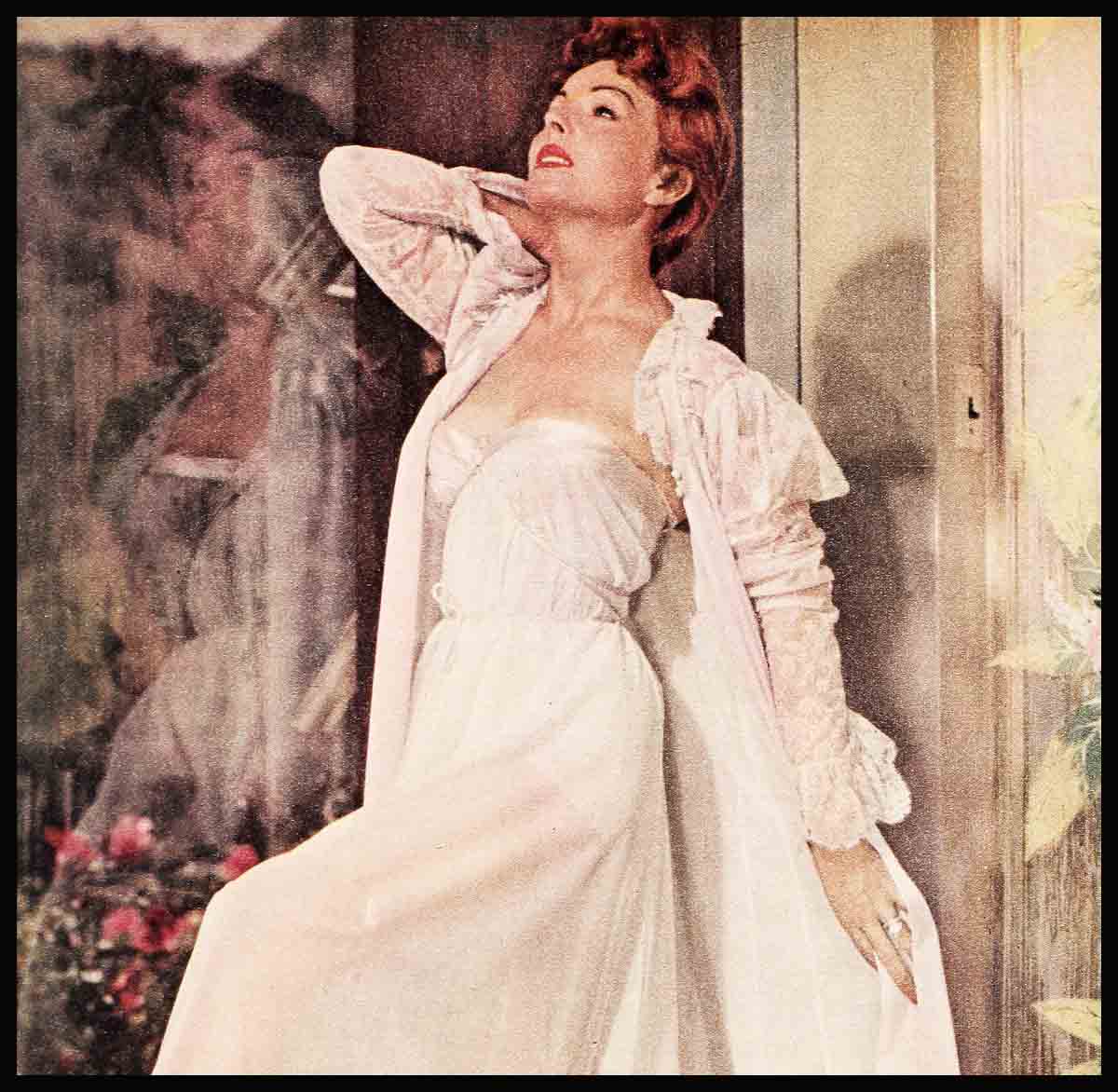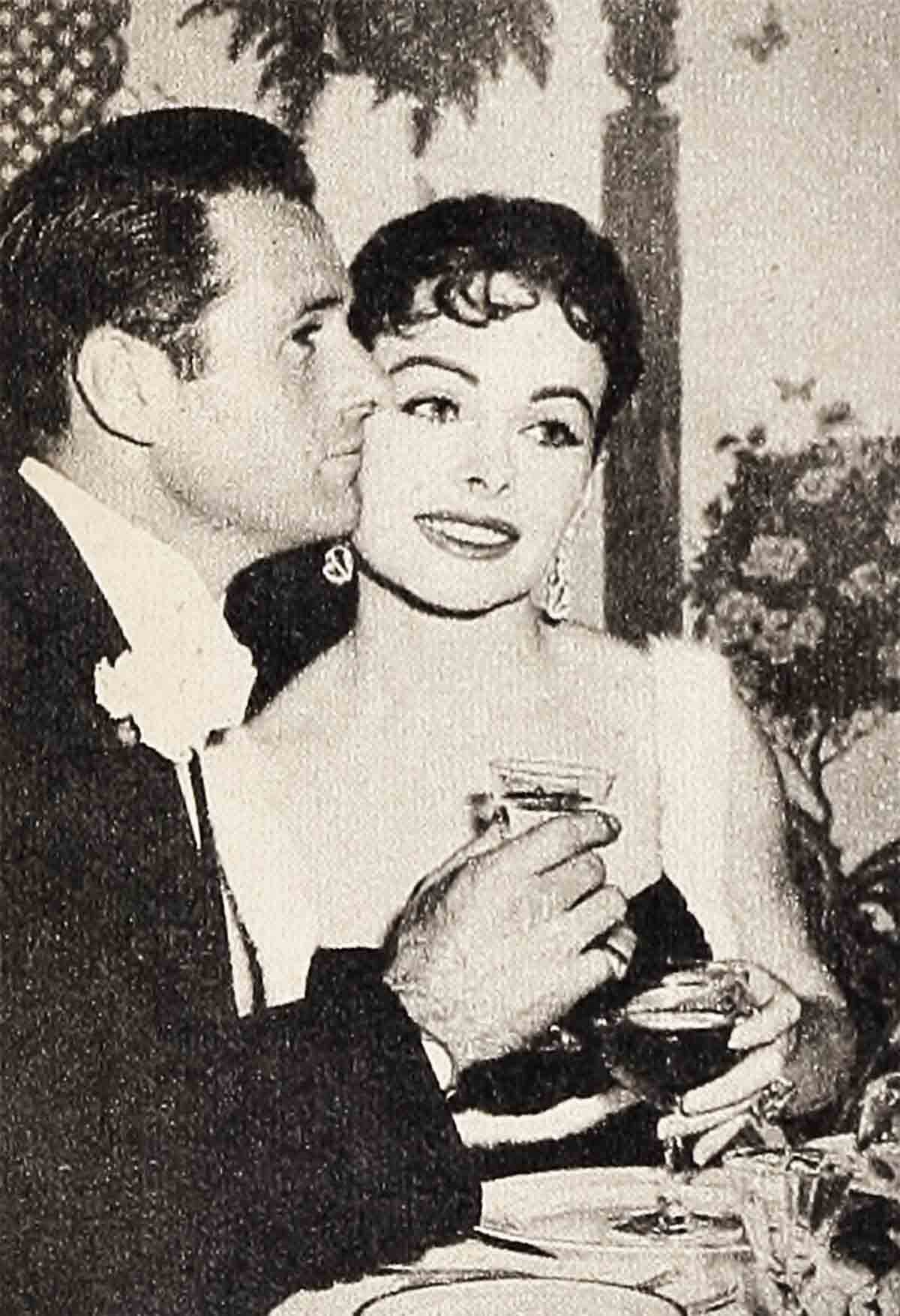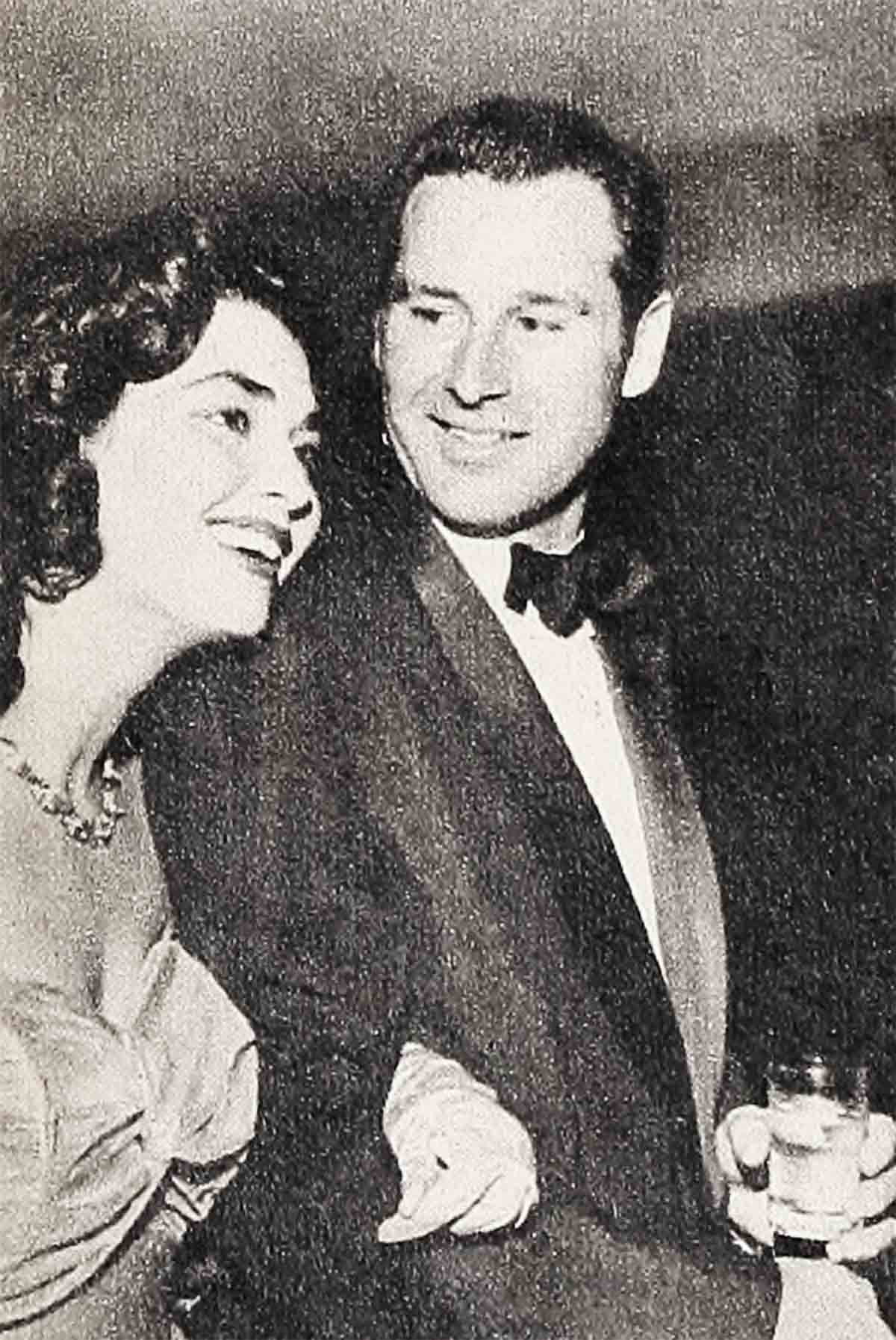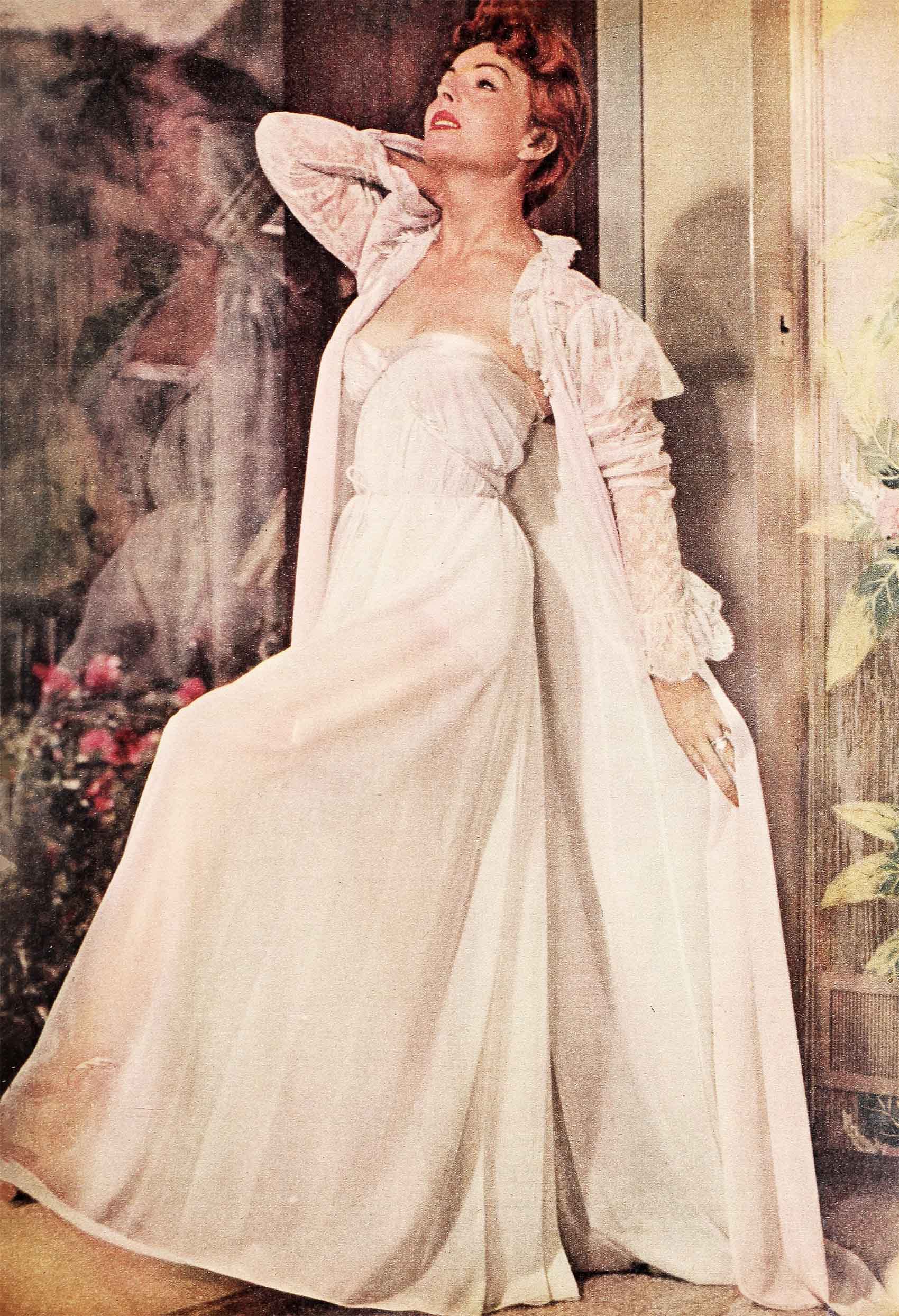
Can Jeanne Crain Keep Her Husband Home?
One sunny day not long ago, a convertible came whizzing down Roxbury Drive in Beverly Hills and swooped into the driveway of a sprawling pink home. The handsome young man at the wheel leaped out, scooped up three or four suits hanging over the seat and hurried to the front door.
But before he got there, the door opened and a trim-figured, dark-haired girl with a lilt in her step rushed out to meet him. They kissed tenderly and she murmured, “Hello. Welcome home.”
The man was Paul Brinkman; the girl was his almost-ex-wife Jeanne Crain—and the bright occasion was Reconciliation Day.
It was a day for which Paul had been working for months. It was a day which Jeanne, frankly, had never expected to see, despite her love for him, her secret hope that somehow their personal problems might be resolved. Despite all the bitterness that had gone before.
It was less than a year after their perfect marriage had blown up in an explosive quarrel over an exposé magazine’s lurid account of Paul’s alleged extra-marital capers. Less than a year, and the Brinkmans kissed and made up.
But can it last?
Can there be hope of permanent happiness for a couple who have split as violently as Jeanne and Paul did?
What about Paul’s roving eye, his dinner-for-two dates in quiet out-of-the-way places, his come-on-up-for-a-drink-Jeanne’s-in-Laguna invitations? Can Jeanne Crain keep her husband home now—any more than she could a year ago?
The Brinkmans have a devout hope that their marriage can be saved. They admit that their four small children, whose happiness mean so much to them, and their Catholic religion which frowns on, divorce, have played a strong part in their reunion.
But it’s more than that.
Jeanne and Paul are still in love. Despite everything that has happened, they have never fallen completely out of love.
From the beginning, even when things looked blackest, one of their closest friends argued that “No matter what they say, those two love each other. They’ll go back together sooner or later!”
But some of their other friends were less optimistic. “Sure the children and their religion are a strong pull,” argued one. “But Jeanne has a lot of bad memories to overcome, And the very fact that she is so religious can make it twice as hard for her to forgive Paul’s playing around—and his knocking her around! It can’t be wiped out, just like that. Even if Jeanne wants to forget it!”
So how come?
Well, for one thing, Paul was on a strong campaign to win Jeanne back. It was a slow job, but he persisted . . . and she didn’t resist too strongly.
A few weeks before they reconciled, Jeanne confided to a friend, “I’ve gotten more red roses from Paul this month than in the last five years of our marriage. If Paul wants to date me and court me a little, it’s all right with me! I tried so hard,” she added, “to think my problems out. It didn’t do any good. I was just about going out of my mind trying to decide what would be the best thing. Now, I’m just going to let things happen as they may. Perhaps fate will take over.”
Since her divorce last August, Jeanne has been unhappy, as few Hollywood stars have ever been over the bust-up of a marriage. She lost weight; she couldn’t sleep; she came perilously close to a complete nervous breakdown.
At first she tried to kid herself and those around her. The lawyers were making out the papers; she was finishing work on The Tattered Dress at UNIVERSAL-INTERNATIONAL; life was about as miserable as it could get; and Jeanne was making quotes like, “Now that it’s over and finished, I feel like I’m starting life over again. Life is suddenly very exciting.”

She knew it wasn’t so
Nonsense! And no one knew it better than Jeanne herself. Life was far from exciting for her. It had become hollow and meaningless and inwardly she was ripping herself apart wondering how much of it might have been her fault, looking for—and afraid to find—the things in herself that might have triggered Paul’s actions. Had she failed him? How . . . how . . .
After The Tattered Dress was finished, Jeanne went cross country on a publicity tour. She drove herself—hard—and she came back to Hollywood tired and sick. Within days she was in ST. JOHN’S HOSPITAL in Santa Monica, for what was officially described as nervous exhaustion.
“A more correct diagnosis would be a broken heart,” said one bitter friend, bitter towards Paul for the misery he had created. “What was he looking for, anyway? . . . That he couldn’t find right in his own wife!”
Then another picture came along, costarring with Frank Sinatra. She took it. She wanted to be busy.
“After the picture is over I’m going to do some of the things I’ve never had time to do before. I’ll travel . . . I’d like to take up painting in Paris . . . I’m going to sign up for courses in astronomy and sculpture at UCLA.”
But living wasn’t much fun for Jeanne without Paul.

“Can Daddy come home?”
Because of the children, Jeanne and Paul never stopped seeing each other entirely. He’d come around to the Beverly Hills house for Sunday brunch. Or they’d take the children out for dinner. And Paul, Jr., Michael, Timothy and Jeanine, hopping up and down would beg, “Can’t Daddy come home this time?” The coffee got cold and the ice cream melted while Jeanne’s and Paul’s eyes locked, both ashamed of what had happened. And Paul would start to say, “Honey, couldn’t we . . .” And her heart would break a little more with yearning, with wanting.
Jeanne justified these dinners—to her friends, to herself—by saying, “For the sake of the children, I think it’s best for us to be friendly.” And in a little while, Paul and Jeanne and the children would be having dinner again, and Paul would look at Jeanne, and beg with his eyes . . .
But every couple of weeks Jeanne would read another item about him dating some pretty young thing. And the hope would go out of her again, and her heart would flip again—with pain.
Until suddenly the items stopped, and Paul was always out stag.
He wanted Jeanne back, and he stopped dating even though now he was free.
On the sidelines, there were powerful forces pulling in opposite directions. Jeanne’s mother and younger sister, who had never wanted her to marry Brinkman in the first place, talked only about his escapades, his violent jealousy, his “sponging” off Jeanne for most of their married life. It’s always been an unfortunate in-law relationship.
On the other hand, Jeanne’s priest didn’t feel that way at all. Neither did Reconciliation Judge Lewis Drucker, who had talked to Jeanne and Paul several times before the decree was granted.
And time was working its healing magic . . . when suddenly there were new headlines which could have’ smashed the whole thing.
A warrant was out for Paul’s arrest; the police were looking for him.
He’d gotten in a fight with wealthy manufacturer Homer Rhoads, a man who had entered the picture earlier as a possible threat to Paul’s hopes for a reconciliation.
Paul claimed that Rhoads, in the process of divorcing his own wife, was pestering Jeanne for dates. Paul went to Rhoads’ Hollywood apartment to tell him to lay off, and within minutes fists were flying. Rhoads accused Paul of assaulting him, and the police went looking for Brinkman. The next night, according to Paul, Rhoads called Jeanne’s home and threatened to kill Brinkman.
“That’s when Jeanne got so nervous about the whole thing that she left the phone off the hook,” Paul said. “Rhoads must be crazy if he thinks he’s going to marry Jeanne.”
But Rhoads publicly announced that he was getting a divorce to marry Jeanne.
She promptly told reporters that he wasn’t marrying him or anybody else.

Something special
Up until this time, Jeanne and Paul had not appeared together in public except for their occasional Sunday dinners with the children. Then something happened. What it was, exactly, probably even Jeanne couldn’t say. But Paul invited her to a New Year’s eve party hosted by their good friends the Tex Feldmans, and she accepted.
“It should be fun,” Paul assured her. “It’s a costume party with a My Fair Lady theme. The girls are all supposed to wear gowns of the 1906 period.”
New Year’s eve . . . that’s something special . . . just a year ago they had celebrated their tenth wedding anniversary with the Feldmans, on the same night—December 31.
Yes, she said, she’d love to go.
The night of the party, Jeanne and Paul paused quite a stir as they walked in together. When they posed for pictures, the cameramen asked, “May we say this is a reconciliation?”
Jeanne and Paul smiled. “Definitely!”
Jeanne didn’t wear her wedding ring, but she did have a stunning sparkler on her finger, a king-size aquamarine flanked diamonds. Yes, it was from Paul, an eleventh-anniversary present.
Jeanne looked radiant—and her old vivacious self. And Paul’s attentiveness said, plainer than any words, how precious she was to him. They acted like a pair of hand-holding newlyweds and theirs was gay table that evening. How long since they had danced together? How lonely the long year had been!
Neither Jeanne nor Paul has said much about the reconciliation.
“I’d rather wait a while before I talk about it,” Jeanne says cautiously.
“There’s been too much conversation with reporters in the past,” Paul. complains. “That’s been one of our troubles. I think we’ll do better if we keep our personal lives out of the headlines.”
“They’ve both learned a lesson,” a friend of Paul’s says. “Remember, neither of them was completely blameless. Paul look the brunt of it, because of his violence. But Jeanne wasn’t entirely in the clear! A lot will depend on whether or not Paul learns to curb his hot temper. It’s always gotten him into trouble.”
And while movie fans and gossip columnists cross country and back argued pro and con on whether Jeanne and Paul should have tried it again—Mr. and Mrs. Paul Brinkman quietly packed their bags and made their reservations for a second honeymoon, a second stab at happiness, on the sun-washed sands of Hawaii.
But—can it last?
Can Jeanne Crain keep her husband home?
THE END
—BY DICK WILLIAMS
Jeanne will soon be seen in U-I’s The Tattered Dress and Paramount’s The Joker Is Wild.
It is a quote. MODERN SCREEN MAGAZINE APRIL 1957




